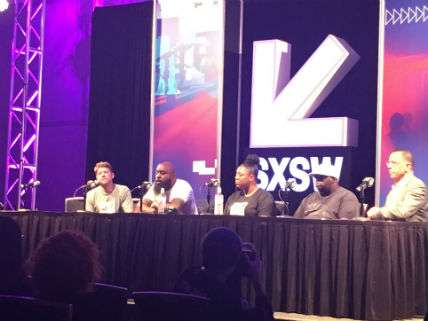New Footage of Michael Brown Discussed at Emotional SXSW Panel
More than two years later, details of the events the preceded the police shooting in Ferguson remain fuzzy.

Filmmaker Jason Pollock says he uncovered explosive video footage that proves Missouri police suppressed evidence in order to create the impression that Michael Brown, the teenager shot by a cop in Ferguson, Missouri, in 2014, robbed a convenience store shortly before the encounter.
A new documentary that premiered at the movie, music, and tech festival South by Southwest (SXSW) this weekend includes a clip from a security camera that allegedly shows Brown entering the shop around 1 o'clock that morning and exchanging a small item with a clerk for a couple of cartons of cigarillos. But before leaving, Brown hands the bag back over the counter. Pollack says he was trading marijuana for the goods but decided to come back for them later—thus providing an alternative explanation for footage, released by officials in the aftermath of the shooting, that appeared to show Brown forcing his way out of the store later that day without paying for some merchandise.
A lawyer representing the owners of the store denied that accusation, telling The New York Times late last week, "There was no transaction." Then today, St. Louis County Prosecuting Attorney Bob McCulloch went even further, calling the documentary, Stranger Fruits, "pathetic" and suggesting the pivotal clip was doctored.
A very angry Pollack appeared with Brown's father, Brown's uncle, a local reporter who covers Ferguson, and the mayor of a nearby town on a SXSW panel this afternoon, immediately after McCulloch's statement. "Anybody been watching television the last 24 hours?" he asked. "Michael didn't rob the fucking store."
"In some ways I think that fake news began by the Ferguson Police," he added, "to make us think that Michael Brown was a bad guy, to make us think that he deserved to be killed in the middle of the street and left there for four and a half hours."
The director—who became ever more animated over the course of the 75-or-so-minute session—contrasted starkly with the other panelists, who largely remained calm and composed. Brown's father, Michael Brown Sr., was the heart of the event, even as he was the quietest person there. At one point, when Pollock began fuming about reporters who ask the elder Brown how he feels about his son's death, the still-grieving dad respectfully demurred.
"It's like, are you fucking kidding me?" Pollack said. "This is everybody, though. Everybody asks him that question."
"Some people don't know no better," Brown replied. "In the beginning it made me angry. But I run across a lot of people that just don't know what to say, so if they do get some type of courage, of course it might just come out crazy. I hug them anyway and go on about my way…Treating people a certain type of way because I feel a certain type of way, it's not healthy. I still greet them with respect and show them love, and some people will realize, like, 'Ooh, I didn't mean to say it like that.' It's OK…I'm not the type of person that's going to take it the wrong way. I understand."
He went on to talk about the organization he started to help him cope, the Michael Brown Chosen for Change Foundation, and the annual retreat he runs for fathers who have lost a child to police violence. "We all get together once a year and participate in trying to heal," he said. "We think that the man is supposed to be this tough guy. But we hurt too. We might hold it in in a different type of way. But we need healing too."


Show Comments (62)